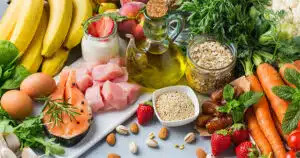Toward the end of last year, one of the lovely ladies in the Membership programme showed me some recent research on dairy and ovulation. This really made me question the recommend to cut dairy out of your PCOS diet.
I wondered if I had gotten it all wrong.
So, I looked into it extensively again. And I thought I would share my findings (particularly for those of you who are still on the fence about giving up dairy).
So, here we go:
Low fat dairy products and fertility

On the other hand, having high-fat dairy seemed to lower this risk.
So the question was, should we be having dairy (and high fat dairy at that).
My initial thought is that if you are going to have dairy, full fat would be the way to go. A lot of low fat products are full of sugar or sweeteners that will cause your insulin levels to spike.
Secondly, this research was done on 18 555 with fertility problems, but not necessarily PCOS.
So, that brings me round to the question of whether women with PCOS should have dairy.
The main problem with dairy is that contains a chemical called Insulin-Growth Factor 1 or IGF-1, which basically mimics insulin in the body. And that is what is problematic for women with PCOS.
Let’s have a look at IGF-1 in a bit more detail:
IGF-1 is a hormone that is present in all forms of milk, from human breast milk to goat’s milk. It makes sense. IGF-1 stimulates growth. One study found that mothers who had higher levels of IGF-1 in their milk also had babies with high weight gain.
Although IGF-1 is present in other forms of animal protein, it doesn’t seem to have as much impact as dairy does on our IGF-1 levels. (2)
What’s the deal with IGF-1 and PCOS?

And the IGF-1 in PCOS causes your ovaries to release too much testosterone – something we really want to avoid.
Interestingly, one of the ways that Metformin works for women with PCOS is by helping to normalise the ratio between IGF-1 and IGFBP-1. (4)
But there’s more.
Not only do we have less IGFBP-1, but we also have a tendency to have high insulin levels. This causes the ovaries to be more sensitive to IGF-1. (5)
So, basically, IGF-1 is something we’re going to want to avoid.
Now, I know you’re probably asking yourself some questions. Let me see if I can answer them for you.
Is goat’s milk or lactose free milk okay?
No. Both goat’s milk and lactose free milk will still have IGF-1 so we want to avoid them.
What about butter?
Well, butter is an interesting one, really. I do have butter on a regular basis. And here’s why. The dairy content in butter is very low. It is predominantly fat. It is a great source of vitamins and minerals (especially fat soluble ones). (6)
If you are going to eat butter, grass fed butter is your best bet. Kerrygold Pure Irish butter is grass fed and is readily available in most grocery stores.
Are eggs okay?
Yes! Eggs are not considered dairy and have a lot of great nutrients. (7)
What about my bones?

Calcium is an important factor is bone growth and strength but there are a lot of dietary sources of calcium apart from milk.
Also, you have to have Vitamin D for Calcium to be absorbed by the body. But, up to 80% of women with PCOS are also deficient in Vitamin D.
So, I strongly suggest a Vitamin D supplement like this one to make sure you’re getting enough so that you can absorb your Calcium.
And lastly, exercise is the most effective way to increase bone density and prevent osteoporosis. (8)
So, ditch the dairy and get moving instead.
Let’s wrap this all up then.
We’ve said that although high fat dairy impacts on fertility less, all dairy should be avoided for women with PCOS. If you’re worried about Calcium and your bones, take a Vitamin D supplement and get moving.
I know that giving up dairy can be tough but once you do, you’ll hardly miss it.
Have you given up dairy and seen any improvements in your PCOS? Let me know and leave a comment below!
- sustainable pcos weight loss strategies
- Over 5500 women have done it and seen results
- [bonus] Done for you pcos meal plans
- [bonus] intermittent fasting for pcos course
- [BONUS] personalised nutrition plan
JOIN OVER 5,500 OTHERS








